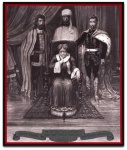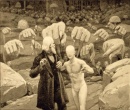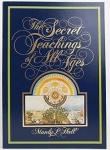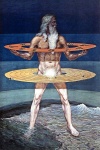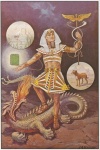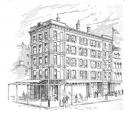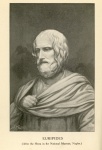J. Augustus Knapp: Difference between revisions
| (10 intermediate revisions by the same user not shown) | |||
| Line 1: | Line 1: | ||
'''J. Augustus Knapp''' was an American [[Theosophist]] and artist best known for his | '''J. Augustus Knapp''' was an American [[Theosophist]] and artist best known for his superb illustrations of [[Manly Palmer Hall|Manly P. Hall's]] masterwork '''''The Secret Teachings of All Ages''''' and many works of science fiction and fantasy. | ||
[[File:J A Knapp as young man .jpg|right|150px|thumb|Young J. A. Knapp]] | [[File:J A Knapp as young man .jpg|right|150px|thumb|Young J. A. Knapp]] | ||
| Line 10: | Line 10: | ||
== Theosophical society involvement == | == Theosophical society involvement == | ||
[[File:Scottish Rite 33rd degree.png|right|150px|thumb|Scottish Rite 33rd degree]] | [[File:Scottish Rite 33rd degree.png|right|150px|thumb|Scottish Rite 33rd degree]] | ||
Knapp was admitted as a member of the [[Cincinnati Theosophical Society]] on January 19, 1892, giving his mailing address as "Strobridge Lith. Co., Cincinnati, O."<ref>Theosophical Society General Membership Register, 1875-1942 at [http://tsmembers.org/ http://tsmembers.org/]. See book 1, entry 7876 (website file: 1C/49).</ref> Both he and his wife attended lodge meetings at the home of [[Jirah Dewey Buck|Dr. J. D. Buck]], and the also weekly Secret Doctrine class studying [[The Secret Doctrine (book)|''The Secret Doctrine'']] using [[William Quan Judge|William Quan Judge’s]] new book [[The Ocean of Theosophy (book)|''The Ocean of Theosophy'']] as a guide. <ref>Minutes books, Cincinnati Theosophical Society Records. Records Series 20.01. Theosophical Society in America Archives.</ref> They | Knapp was admitted as a member of the [[Cincinnati Theosophical Society]] on January 19, 1892, giving his mailing address as "Strobridge Lith. Co., Cincinnati, O."<ref>Cincinnati Theosophical Society minutes book, volume 1, page 278. January 12 and 19, 1892. Cincinnati Theosophical Society Records. Records Series 20.02.01. Theosophical Society in America Archives.</ref><ref>The date of January 19 is given in the Theosophical Society General Membership Register, 1875-1942 at [http://tsmembers.org/ http://tsmembers.org/]. See book 1, entry 7876 (website file: 1C/49).</ref> Both he and his wife attended lodge meetings at the home of [[Jirah Dewey Buck|Dr. J. D. Buck]], and the also weekly Secret Doctrine class studying [[The Secret Doctrine (book)|''The Secret Doctrine'']] using [[William Quan Judge|William Quan Judge’s]] new book [[The Ocean of Theosophy (book)|''The Ocean of Theosophy'']] as a guide. <ref>Minutes books, Cincinnati Theosophical Society Records. Records Series 20.01. Theosophical Society in America Archives.</ref> They | ||
gave lectures at the lodge. For example, on October 18, 1893 Mr. Knapp spoke on "The Aims Objects and Aims of the Theosophical Society; on November 7th Mrs. Knapp helped present "Evolution as Taught by Modern Science and Evolution as Taught by the Secret Doctrine;" and the next week Mr. Knapp helped present "The Septenary Man."<ref>Anonymous, "Mirror of the Movement: Cincinnati" ''The Path 8 no.9 (December, 1893): 290.</ref> | gave lectures at the lodge. For example, on October 18, 1893 Mr. Knapp spoke on "The Aims Objects and Aims of the Theosophical Society; on November 7th Mrs. Knapp helped present "Evolution as Taught by Modern Science and Evolution as Taught by the Secret Doctrine;" and the next week Mr. Knapp helped present "The Septenary Man."<ref>Anonymous, "Mirror of the Movement: Cincinnati" ''The Path 8 no.9 (December, 1893): 290.</ref> | ||
In 1895, when most branches (lodges) of the American Section voted to separate from the parent society in Adyar, the Cincinnati group also voted to follow Vice-President William Quan Judge into establishment of a new national organization. Knapp accompanied Walter Thompson and Dr. | In 1895, when most branches (lodges) of the American Section voted to separate from the parent society in Adyar, the Cincinnati group also voted to follow Vice-President William Quan Judge into establishment of a new national organization. Knapp accompanied Walter Thompson and Dr. Buck to the new organization's convention in New York in 1896. A reporter from the ''Cincinnati Enquirer'' wrote of the event: | ||
<blockquote> | <blockquote> | ||
On either side of the platform were pictures of the two prominent Theosophist most spoken of – a watercolor of HP Blavatsky, founder of the Theosophical society, and a large photograph of William Q. Judge, for many years president of the Theosophical Society in America. The watercolor of Mrs. Blavatsky is the work of J. Augustus Knapp, a prominent theosophist and artist, illustrator of the well-known work of John Uri Lloyd, '' | On either side of the platform were pictures of the two prominent Theosophist most spoken of – a watercolor of HP Blavatsky, founder of the Theosophical society, and a large photograph of William Q. Judge, for many years president of the Theosophical Society in America. The watercolor of Mrs. Blavatsky is the work of J. Augustus Knapp, a prominent theosophist and artist, illustrator of the well-known work of John Uri Lloyd, ''Etidorhpa''.<ref>Anonymous, "Theosophist Meet in Convention Here" ''Cincinnati Enquirer'' (May 30, 1896): 10.</ref> | ||
</blockquote> | </blockquote> | ||
Knapp continued to be active with that group rather than affiliating with the [[Theosophical Society (Adyar)|Theosophical Society in Adyar, India]]. On March 2, 1897, he delivered a presentation on the "The Law of Duality in Manifested Nature." On October 8, 1900, he spoke on "The Problem of Life," and on April 21, 1901, on "The Law of Analogy."<ref>Program 1900-1901 [pamphlet], Cincinnati Theosophical Society Records. Records Series 20.01. Theosophical Society in America Archives.</ref><ref>Anonymous, "Law of Duality" ''Cincinnati Post'' (March 2, 1897): 5.</ref> | Knapp continued to be active with that Cincinnati group rather than affiliating with the [[Theosophical Society (Adyar)|Theosophical Society in Adyar, India]]. On March 2, 1897, he delivered a presentation on the "The Law of Duality in Manifested Nature." On October 8, 1900, he spoke on "The Problem of Life," and on April 21, 1901, on "The Law of Analogy."<ref>Program 1900-1901 [pamphlet], Cincinnati Theosophical Society Records. Records Series 20.01. Theosophical Society in America Archives.</ref><ref>Anonymous, "Law of Duality" ''Cincinnati Post'' (March 2, 1897): 5.</ref> | ||
== Freemasonry == | == Freemasonry == | ||
| Line 55: | Line 55: | ||
Many of Knapp's illustrations have probably not been credited to him, but his name is associated with these books: | Many of Knapp's illustrations have probably not been credited to him, but his name is associated with these books: | ||
* Collins, Laura Case. ''Egypt''. Cincinnati: The Robert Clarke Company, 1900. A book of poetry. | * Collins, Laura Case. ''Egypt''. Cincinnati: The Robert Clarke Company, 1900. A book of poetry. | ||
* Euripedes, translated by James M. Pryse. ''The Adorers of Dionysos (Bakchai)''. London: Watkins, 1925. | * Euripedes, translated by James M. Pryse. ''The Adorers of Dionysos (Bakchai)''. London: Watkins, 1925. Available online at [https://books.google.com/books?id=Af4FAQAAIAAJ&printsec=frontcover&source=gbs_ViewAPI#v=onepage&q&f=false Google Books] and [https://archive.org/details/adorersofdionyso0000euri Internet Archive]. | ||
Knapp also wrote his own book, '''''Divination with Tarot Cards''''', published by Llewellyn Publications in Los Angeles, 1936. | Knapp also wrote his own book, '''''Divination with Tarot Cards''''', published by Llewellyn Publications in Los Angeles, 1936. | ||
== Gallery of his work == | == Gallery of his work == | ||
A huge selection of illustrations from '''''The Secret Teachings of All Ages''''' is available at the [https://www.universalfreemasonry.org/en/gallery/secret-teachings Universal Co-Masonry website]. Here are some examples of Knapp's works from other sources: | |||
<gallery widths="130px" heights="150px" perrow="5"> | <gallery widths="130px" heights="150px" perrow="5"> | ||
| Line 72: | Line 74: | ||
File:Knapp The Jewel of the Rose Croix.jpg|<center>The Jewel of the Rose Croix</center> | File:Knapp The Jewel of the Rose Croix.jpg|<center>The Jewel of the Rose Croix</center> | ||
File:Knapp HPB home.png|<center>HPB home on 47th St, New York</center> | File:Knapp HPB home.png|<center>HPB home on 47th St, New York</center> | ||
</gallery> | |||
== Illustrations from ''The Adorers of Dionysos'' == | |||
Knapp illustrated ''The Adorers of Dionysos'' by Euripedes, translated by James M. Pryse in 1925: | |||
<gallery widths="130px" heights="150px" perrow="6"> | |||
File:Knapp_1.jpg|<center>Euripedes</center> | |||
File:Knapp_2.jpg|<center>Asian maidens</center> | |||
File:Knapp_3.jpg||<center>Dancing maidens illustration</center> | |||
File:Knapp_4.jpg||<center>Bull as guide</center> | |||
File:Knapp_5.jpg|<center>Girl-faced stranger</center> | |||
File:Knapp_6.jpg|<center>Moving me to laughter</center> | |||
</gallery> | </gallery> | ||
Latest revision as of 21:21, 28 September 2023
J. Augustus Knapp was an American Theosophist and artist best known for his superb illustrations of Manly P. Hall's masterwork The Secret Teachings of All Ages and many works of science fiction and fantasy.
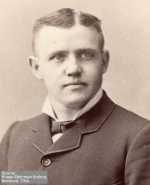
Personal life
John Augustus Knapp was born in Newport, Kentucky on December 1, 1853 as the son of German immigrants. He studied at the McMicken School of Design in Cincinnati, Ohio. He married Emily A. Spring (1858-1910) and they had a daughter Ethel (1880–1943). In 1918, Knapp moved to Los Angeles, although he also spent time living with his daughter Ethel and her family in Norwood, a neighborhood of Cincinnati. His wife Emily had died in 1910, and by 1930 he remarried to a woman named Laura, and was permanently settled in California.
He died in Los Angeles on March 10, 1938.
Theosophical society involvement
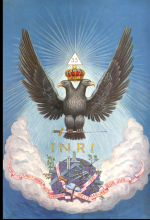
Knapp was admitted as a member of the Cincinnati Theosophical Society on January 19, 1892, giving his mailing address as "Strobridge Lith. Co., Cincinnati, O."[1][2] Both he and his wife attended lodge meetings at the home of Dr. J. D. Buck, and the also weekly Secret Doctrine class studying The Secret Doctrine using William Quan Judge’s new book The Ocean of Theosophy as a guide. [3] They gave lectures at the lodge. For example, on October 18, 1893 Mr. Knapp spoke on "The Aims Objects and Aims of the Theosophical Society; on November 7th Mrs. Knapp helped present "Evolution as Taught by Modern Science and Evolution as Taught by the Secret Doctrine;" and the next week Mr. Knapp helped present "The Septenary Man."[4]
In 1895, when most branches (lodges) of the American Section voted to separate from the parent society in Adyar, the Cincinnati group also voted to follow Vice-President William Quan Judge into establishment of a new national organization. Knapp accompanied Walter Thompson and Dr. Buck to the new organization's convention in New York in 1896. A reporter from the Cincinnati Enquirer wrote of the event:
On either side of the platform were pictures of the two prominent Theosophist most spoken of – a watercolor of HP Blavatsky, founder of the Theosophical society, and a large photograph of William Q. Judge, for many years president of the Theosophical Society in America. The watercolor of Mrs. Blavatsky is the work of J. Augustus Knapp, a prominent theosophist and artist, illustrator of the well-known work of John Uri Lloyd, Etidorhpa.[5]
Knapp continued to be active with that Cincinnati group rather than affiliating with the Theosophical Society in Adyar, India. On March 2, 1897, he delivered a presentation on the "The Law of Duality in Manifested Nature." On October 8, 1900, he spoke on "The Problem of Life," and on April 21, 1901, on "The Law of Analogy."[6][7]
Freemasonry
In addition to his activities in the Theosophical Society, Knapp was an honorary 33° Scottish Rite Freemason. Dr. Buck and James Ralston Skinner were also Masons in Cincinnati.
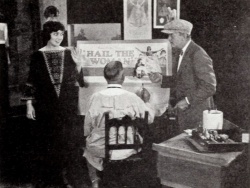
Artistic career
Much of Knapp's career was spent in illustrating a wide variety of books and magazines – occult works, science fiction, poetry, and scientific drawings. One of his paintings that has been of special interest to Theosophists for decades is of Theosophical Society Founder Helena Petrovna Blavatsky seated, with three "Ascended Masters" around her. He also painted posters for Thomas Ince Studios in the early days of Hollywood filmmaking.
Cincinnati years
Early in his career, he held positions in design and lithography at Russell Morgan Lithograph, Strobridge Lithograph, and Cincinnati Process Engraving. At Standard Publishing, he illustrated books and magazines, and it was there that he became acquainted with brothers Curtis Gates Lloyd and John Uri Lloyd.
His first collaboration with John Uri Lloyd was the hugely popular Etidorhpa, or, the End of the Earth: the Strange History of a Mysterious Being and the Account of a Remarkable Journey (1895), which was printed in eighteen editions and in seven languages. It is a fantastic tale of a hollow earth. The title is "Aphrodite" spelled backward. Other joint efforts included The Right Side of the Car (1897) and Felix Moses: the Beloved Jew of Stringtown on the Pike (1930).
Curtis Gates Lloyd commissioned the artist to create a portfolio of color illustrations of mushrooms. Plates of Fungi was produced between 1910-20. The originals are displayed at the Lloyd Library and Museum.
Los Angeles years
"In 1918, Knapp moved to Los Angeles, California, where he continued working as a designer, illustrator and painter, at one time employed by Thomas Ince Studios where he participated in the very early days of the movie industry."[8]
While Knapp was no longer active in Theosophical lodge activity, he very likely came into contact with Theosophists at the Krotona Institute in Hollywood; Rosicrucian Max Heindel; astrologer and screenwriter Marc Edmund Jones; James Morgan Pryse; and, of course, Manly Palmer Hall.
Manly Palmer Hall collaborations
Working with Manly Palmer Hall brought him an additional measure of fame. They worked together to design one of the most admired Tarot decks. Knapp illustrated many of Hall's occult books and periodicals, including:
- An Encyclopedic Outline of Masonic, Hermetic, Qabbalistic, and Rosicrucian Symbolical Philosophy: Being an Interpretation of the Secret Teachings Concealed within the Rituals, Allegories, and Mysteries of All Ages. Privately printed by subscription in 1928, this work has been almost continuously in print since then in many editions and under various titles. For this work Knapp created fifty-four full-page color plates that are amazing in their depth of detail.
- The Initiates of the Flame: He Who Lives the Life Shall Know the Doctrine. Los Angeles, 1922. Later editions.
- The Lost Keys of Freemasonry or, the Secret of Hiram Abiff. New York: Macoy, 1923. Many later editions.
- The Tarot: an Essay. Los Angeles: Philosophical Research Society, 1978. Previous and later editions.
- The Phoenix: an Illustrated Review of Occultism and Philosophy. Los Angeles: Hall Publishing, 1931, with subsequent editions in 1945, 1956, 1960, 1971, and 1975 that are effectively reprints. The first edition is available as a PDF at IAPSOP website.
Other works
Many of Knapp's illustrations have probably not been credited to him, but his name is associated with these books:
- Collins, Laura Case. Egypt. Cincinnati: The Robert Clarke Company, 1900. A book of poetry.
- Euripedes, translated by James M. Pryse. The Adorers of Dionysos (Bakchai). London: Watkins, 1925. Available online at Google Books and Internet Archive.
Knapp also wrote his own book, Divination with Tarot Cards, published by Llewellyn Publications in Los Angeles, 1936.
Gallery of his work
A huge selection of illustrations from The Secret Teachings of All Ages is available at the Universal Co-Masonry website. Here are some examples of Knapp's works from other sources:
-
HPB with Ascended Masters -
Cover of Etidorpha -
Etidorpha illustration -
Book cover -
Grand Man of the Zohar -
The Hand of the Mysteries -
Hermes on the Back of Typhon -
Grand Rosicrucian Alchemical Formula -
The Jewel of the Rose Croix -
HPB home on 47th St, New York
Illustrations from The Adorers of Dionysos
Knapp illustrated The Adorers of Dionysos by Euripedes, translated by James M. Pryse in 1925:
-
Euripedes -
Asian maidens -
Dancing maidens illustration -
Bull as guide -
Girl-faced stranger -
Moving me to laughter
Additional resources
Collections and archives
- Lloyd Library and Museum in Cincinnati. Correspondence and plates.
Social Media
- J. Augustus Knapp Facebook page.
- Augustus Knapp Pinterest page.
Notes
- ↑ Cincinnati Theosophical Society minutes book, volume 1, page 278. January 12 and 19, 1892. Cincinnati Theosophical Society Records. Records Series 20.02.01. Theosophical Society in America Archives.
- ↑ The date of January 19 is given in the Theosophical Society General Membership Register, 1875-1942 at http://tsmembers.org/. See book 1, entry 7876 (website file: 1C/49).
- ↑ Minutes books, Cincinnati Theosophical Society Records. Records Series 20.01. Theosophical Society in America Archives.
- ↑ Anonymous, "Mirror of the Movement: Cincinnati" The Path 8 no.9 (December, 1893): 290.
- ↑ Anonymous, "Theosophist Meet in Convention Here" Cincinnati Enquirer (May 30, 1896): 10.
- ↑ Program 1900-1901 [pamphlet], Cincinnati Theosophical Society Records. Records Series 20.01. Theosophical Society in America Archives.
- ↑ Anonymous, "Law of Duality" Cincinnati Post (March 2, 1897): 5.
- ↑ "John Augustus Knapp" at ARSMagine website. Accessed 1/31/2023. Several Internet sources have the same wording.
